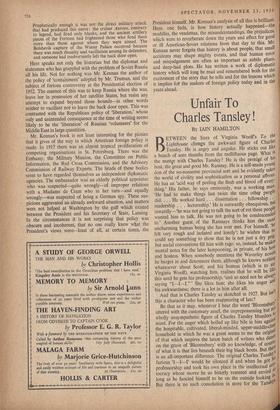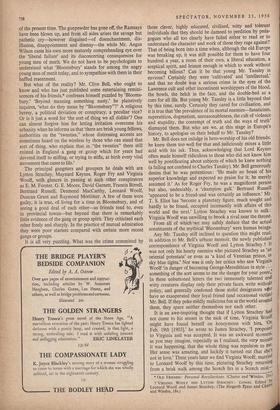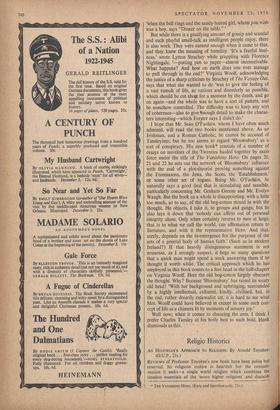Unfair To Charles Tansley !
BY IAIN HAMILTON ETWEEN the lines of Virginia Woolf's To th Lighthouse clumps the awkward figure of Charle Tansley. He is angry and angular. He sticks out lik a bunch of sore thumbs from the mellifluous page. What I the mattir with Charles Tansley? He is the protégé of hi host, the great and good Mr. Ramsay. He is a self-made youR don of the no-nonsense provincial sort and he evidently take the world of civility and sophistication as a personal affront He has an 'acid way of peeling the flesh and blood off every thing.' His father, he says ominously, was a working man `He had to make things last twice the time other peoplI did. . . . He worked hard . . . dissertation . . fellowship . readership . . . lectureship.' He is outwardly obsequious, by inwardly—'he was not going to talk the sort of rot these people wanted him to talk. He was not going to be condescended to.' Another guest of the Ramsays thinks him the most uncharming human being she has ever met. For himself, 'Ile felt very rough and isolated and lonely'; he wishes that he could say something to show that he is not just a dry pa but social conventions fill him with rage; so, instead, he makes mental notes for the later lampooning, in private, of his 110,51 and hostess. When somebody mentions the Waverley novels he barges in and denounces them, although he knows nothing whatsoever about Scott; and his hostess (which is to saY Virginia Woolf), watching him, realises that he will be like this until he gets his professorship, 'and so need not be alwaY1 saying "I-1-1."' She likes him; she likes his anger and his awkwardness; there is a lot in him after all. And that is Charles Tansley as sketched in 1927. But /sill this a character who has been reappearing of late? Be that as it may, whenever 1 hear the word `Bloomsbury uttered with the customary snarl, the unprepossessing but fl° wholly unsympathetic figure of Charles Tansley blunders It/t mind. For the anger which boiled up like bile in him against the hospitable, cultivated, liberal-minded, upper-middle-class household in which he was a guest seems to me the original of that which inspires the latest batch of writers who donee on the grave of 'Bloomsbury' with no knowledge, of course' e of what it is that lies beneath their big black boots. But ther, is an all-important difference. The original Charles, TansleY,; furious would be silenced if and when he got 111, professorship and took his own place in the intellectual arlsn tocracy whose mores he so bitterly resented and envied ,s" long as he fancied himself to be on the outside looking It': But there is no such consolation in store for the TansleY' of the present time. The gunpowder has gone off, the Ramsays have been blown up, and from all sides arises the savage but pathetic cry—however disguised—of disenchantment, dis- illusion, disappointment and dismay—the while Mr. Angus Wilson casts his own more maturely comprehending eye over the 'liberal failure' and its disconcerting consequences for young men of merit. We do not have to be psychologists to understand what 'Bloomsbury' stands for among the angry young men of merit today, and to sympathise with them in their baffled resentment.
But what of the reality? Mr. Clive Bell, who ought to know and who has just published some entertaining remini- scences of his friends,* confesses himself puzzled by 'Blooms- bury.' Beyond meaning something nasty,' he plaintively inquires, 'what do they mean by "Bloomsbury"?' A religious heresy, a political deviation or conspiracy, a peculiar' vice? Or is it just a word for 'the sort of thing we all dislike'? One can almost forgive him for letting irritation overcome his urbanity when he informs us that 'there are brisk young fellows, authorities on the "twenties," whose distressing accents are sometimes heard on the wireless by those who can stand that sort of thing, who explain that in "the twenties" there still existed in England a gang or group which for years had devoted itself to stifling, or trying to stifle, at birth every vital movement that came to life.'
The principal gangsters and groupers he deals with are Lytton Strachey, Maynard Keynes, Roger Fry and Virginia Woolf, with glances in passing at such other conspirators as E. M. Forster, G. E. Moore, David Garnett, Francis Birrell, Bertrand Russell, Desmond MacCarthy, Leonard Woolf, Duncan Grant and Raymond Mortimer. A few of them were guilty, it is true, of living for a time in Bloomsbury, and of seeing a good deal of each other—as friends tend to, even in provincial towns—but beyond that there is remarkably little evidence of the gang or group spirit. They criticised each other freely and sharply. In the practice of mutual admiration they were poor starters compared with certain more recent gangs or groups.
It is all very puzzling. What was the crime committed by those clever, highly educated, civilised, witty and tolerant individuals that they should be damned to perdition by peda- gogues who all too clearly have failed either to read or to understand the character and work of those they rage against? That of being born into a time when, although the old Europe was breaking up, it was still possible for them to have four hundred a year, a room of their own, a liberal education, a sceptical spirit, and leisure enough in which to work without becoming bilious? Can it be that young Mr. Tansley is envious? Certainly they were 'cultivated' and 'intellectual,' and that no doubt was a serious crime in the eyes of the Lawrence cult and other incontinent worshippers of the blood, the bowls, the belch in the face, and the double-bed as a cure for all ills. But young Mr. Tansley is a little beyond that by this time, surely. Certainly they cared for civilisation, and it is true that 'the prevalence of its mortal enemies—fanaticism, superstition, dogmatism, unreasonableness, the cult of violence and stupidity, the contempt of truth and the ways of truth' dismayed them. But who are we, at this stage in Europe's history, to apologise on their behalf to Mr. Tansley?
Mr. Bell does not indulge in hero-worship of his old friends; he knew them too well for that and judiciously mixes a little acid with his ink. Thus, acknowledging that Lord Keynes often made himself ridiculous to those who did not know him well by pontificating about subjects of which he knew nothing (a failing not confined to Charles Tansley), Mr. Bell generously denies that he was pretentious : 'He made no boast of his superior knowledge and expected no praise for it; he merely assumed it.' As for Roger Fry, he was a magnificent person but also, undeniably, a 'champion gull.' Bertrand Russell 'appeared to be a friend and was certainly an influence.' Mr. T. S. Eliot has 'become a planetary figure, much sought and hardly to be found, occupied incessantly with affairs of this world and the next.' Lytton Strachey was known to sulk : Virginia Woolf was unwilling to brook a rival near the throne. From all of which we may safely deduce that the actual constituents of the mythical 'Bloomsbury' were human beings.
Any Mr. Tansley still inclined to question this might read, in addition to Mr. Bell's urbane memoir, the newly published correspondence of Virginia Woolf and Lytton Strachey.t It was not only his hearty enemies who pictured Strachey as 'an oriental potentate' or even as 'a kind of Venetian prince, in sky blue tights.' Nor was it only her critics who saw Virginia Woolf 'in danger of becoming George-Meredithian in style something of the sort seems to me the danger for your genre: In these unbuttoned letters the two immensely talented art) witty creatures display only their private faces, write withoin policy, and generally confound those stolid denigrators 40 have so exasperated their loyal friend (and occasional victitn) Mr. Bell. If they poke mildly malicious fun at the world around them, they spare neither themselves nor each other. It is an awe-inspiring thought that if Lytton Strachey 'had not come to his senses in the nick of time, Virginia VVoolf might have found herself on honeymoon with him. 'Or Feb. 19th [1903],' he wrote to James Strachey, 'I proposed to Virginia and was accepted. It was an awkward moment. as you may imagine, especially as 1 realised, the very minute it was happening, that the whole thing was repulsivle to Me. Her sense was amazing, and luckily it turned out that she's not in love.' Three years later we find Virginia Wool'', married to Leonard Woolf by this time, picturing Strachey returning from a brisk walk among the Scotch firs in a Scotch mist-- • OLD FRIENDS: Personal Recollections. (Chatto and "Windus, 2153 t VIRGINIA WOOLF AND LYTTON STRACHEY: Lettens. Edited by Leonard Woolf and James Strachey. (The Hogarth PAISS and Chatto and Windus, 18s.) `when the bell rings and the sandy-haired girl, whom you wish was a boy, says "Dinner on the table."' But while there is a gratifying amount of gossip and scandal and such playful small-talk as intelligent people enjoy, there is also work. They were earnest enough when it came to that, and they knew the meaning of humility. 'It's a fearful busi- ness,' wrote Lytton Strachey while grappling with Florence Nightingale, `—putting pen to paper—almost inconceivable. What happens? And how on earth does one ever manage to pull through in the end?' Virginia Woolf, acknowledging the justice of a sharp criticism by Strachey of The Voyage Out, says that what she wanted to do 'was to give the feeling of a vast tumult of life, as various and disorderly as possible, which should be cut shoo for a moment by the death, and go on again—and the whole was to have a sort of pattern, and be somehow controlled. The difficulty was to keep any sort of coherence—also to give enough detail to make the charac- ters interesting—which Forster says I didn't do.' I hope that Mr. Sean D'faolain, whom I have often much admired, will read the two books mentioned above. As an Irishman, and a Roman Catholic, he cannot be accused of Tansleyism; but he too seems to regard 'Bloomsbury' as a sort of conspiracy. His new book* consists of a number of essays on novelists of the 'Twenties hauled together by main force under the title of The Vanishing Hero. On pages 20, 21 and 22 he sets out the network of 'Bloomsbury' influence with the zeal of a plot-theorist proving something against the Freemasons, the Jews, the Scots, the 'Establishment,' or some other set of rogues. Being Mr. O'Faohlin, lie naturally says a good deal that is stimulating and sensible. particularly concerning Mr. Graham Greene and Mr. Evelyn Waugh. But the book as a whole is disappointing, with a little too much, so to say, of the old bog-cotton mixed in with the thought. He objects. I take it, to groups and gangs; but he also lays it down that 'nobody can affirm out of personal integrity alone. Only when certainty returns to men at large, that is to what we call the world, can affirmation return to literature, and with it the representative Hero. And that. surely, depends on the re-emergence for the purposes of the arts of a general body of human. faith.' (Such as in modern Ireland?) If that heavily disingenuous statement is not nonsense, as I strongly suspect, it begs so many questions that a quick man might spend a week answering them if he thought it worth while. The critical approach which he has employed in this book comes to a fine head in the half-chapter on Virginia Woolf. Here the old bog-cotton largely obscures the thought. Why? Because 'Bloomsbury' has raised its weary old head! 'With her background and upbringing, surrounded by a highly intellectual, cultured, kindly. civilised. but, in the end, rather drearily rationalist set, it is hard to see what Mrs. Woolf could have believed in except in some such con- cept of life as a chimera lit by moments of sensory joy.'
Well now; when it comes to chancing the arm, I think 1 prefer Charles Tansley at his boily best to such bold, blank dismissals as this.












































































 Previous page
Previous page